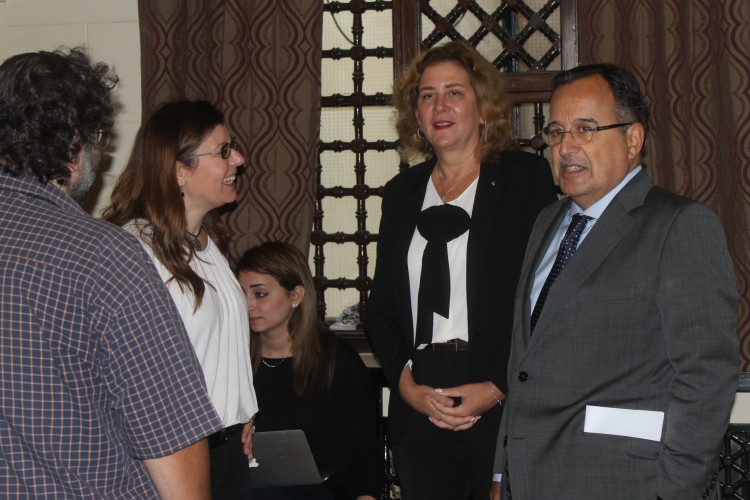Turning the Page on Hate Speech and Unethical Journalism
BY CARAVAN STAFF
@CARAVAN_AUC
![Naila Hamdy (center), JRMC Chair and co-organizer of the conference, welcomes keynote speaker Ambassador and GAPP Dean Nabil Fahmy, (right) [Sama El Feky]](http://www.auccaravan.com/wp-content/uploads/2015/11/hate-e1448147129782.jpg)
[Sama El Feky]
In times of crisis, societies suffer from radicalization and polarization. Hate speech rises out of the chaos, and media outlets often succumb to its rhetoric. Nowadays, inciters are enabled to spread their word more ambitiously, knowing how far new technologies and social media can reach.
The recent terror attacks in Paris resulted in a wide range of reactions. Media outlets took up the scapegoating of Muslims, fueling anti-Muslim sentiment in Europe which also manifested itself in rallies outside the memorial sites.
But even before the Paris attacks, extremists have targeted civilians in Lebanon, Syria, Iraq, Libya, Afghanistan, Pakistan and Nigeria.
Last week, the UK-based Ethical Journalism Network (EJN) warned journalists “to provide accurate, fact- based information; to show humanity and sensitivity in coverage of the victims and their families; and above all to avoid sensationalism that might inspire hate-speech and incitement to yet more violence.”
EJN also maintains that the conflicts in the Middle East have pushed the media to struggle to “maintain standards in the midst of all the political pressures”.
Hoping to combat the pervasiveness of hate speech around the world, AUC’s Department of Journalism and Mass Communication, in coordination with EJN and the Norwegian Institute for Journalism, hosted media professionals and academics from around the world to discuss the phenomenon on November 7.
They also aimed at establishing accessible guidelines for journalists to identify hate speech, and to raise the standards of professionalism and ethics in journalism in the region.
Dean of the School of Global Affairs and Public Policy Nabil Fahmy, who was one of the keynote speakers at the two-day conference, told The Caravan that “[the seminar] is the result of media professionals starting to understand the power they have in their hands and the influence.”
“Therefore,” he added, “the responsibility to ensure professional, ethical journalism, and not to support the utilization of the new technologies to propagate hate speech.”
Rasha Abdulla, a keynote speaker and associate professor of journalism and mass communication, stressed the importance of finding a narrow, specific definition for hate speech.
She said this aspect is crucial as governments can abuse vaguely defined laws to exercise excessive control over the media and to quell voices of dissent.
“Criticism, satirical or otherwise, should go all the way,” Abdulla said.
“The grey lines are only where there is a clear incitement to violence or to killing,” continued Abdulla.
In the meantime, the instantaneous nature of digital media has made journalism more interesting, faster to react to events and often much more effective, but at the same time has also opened the door to a lot of uncontrolled speech.
“Social media and technology have given everybody the chance, as claimed, to be journalists. But has it really, or has it just given people the chance to communicate their opinions or what they’re seeing to the public?” said Tarek Atia conference co-organizer, CEO and founder of the Egypt Media Development Program (EMDP).
“We need to make clear that there is a distinction between those who practice journalism and those practicing freedom of expression,” Atia said.
This is where one of the strategic goals of the seminar comes in. The organizers not only want to stress the importance of understanding the phenomenon of hate speech and provide a place for media practitioners, academics and media managers to openly discuss it, but to also develop an education culture which encourages critical thinking.
Fahmy suggested that the guidelines professionals follow ought to be coupled with cooperation with education systems to teach future professionals to assess content with a critical eye.
But the rise of citizen journalism on social media – which has enabled individuals to freely express their views about any topic discussed on the web – has presented its own set of challenges.
This has led to the question of how to define journalism and classify who exactly is a journalist.
But Chris Elliott, a reader’s editor at The Guardian, explained that journalists should be less worried about what constitutes a journalist and be more concerned about what makes for solid journalism.
“Accuracy, fairness, balance and striving for impartiality are the kind of things that mark professionalism in journalism,” Elliott said.
At the conclusion of the conference, none of the experts supported excessive use of legal measures against hate speech.
In fact, most were in favor of preventing it through the encouragement of open dialogue.
“The best way to fight hate speech is with more speech,” Abdulla said.
“You fight hate speech with media literacy for both presenters and audiences.”
Sama El Feky, Nourhan Saber, Nermin Gerges, Mirel Soliman, Hana Iskander, and Amina Zaineldine attended the two-day forum and filed this report.




